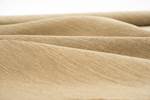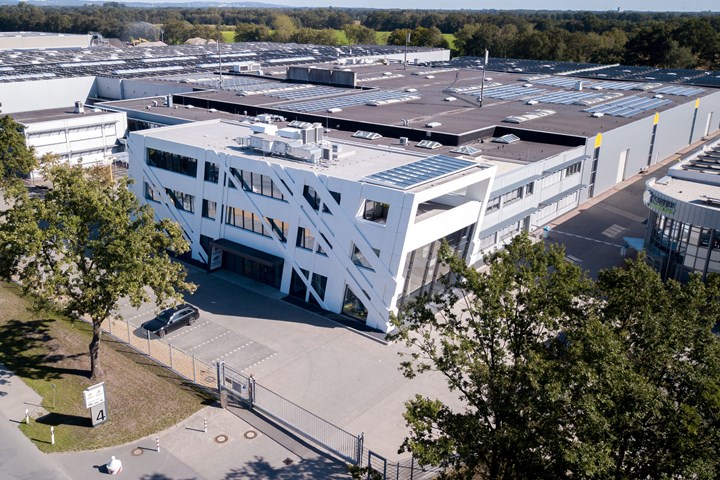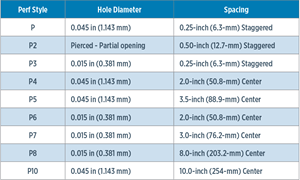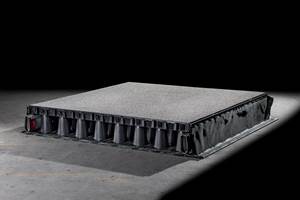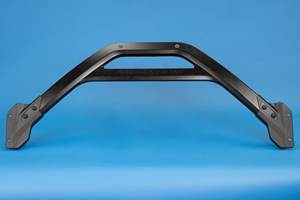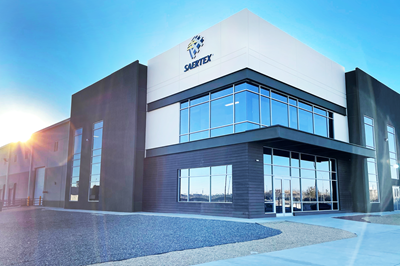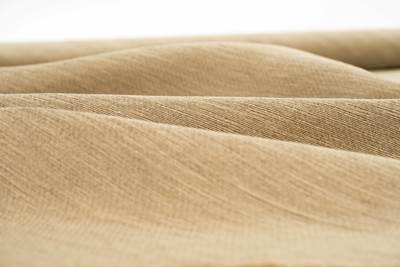Saertex expands global production network capacities for technical textile manufacture
Saertex reorganizes and invests in its 12 global facilities for producing multiaxial NCFs made of glass, carbon, aramid and natural fibers to supply wind power, mobility and industrial markets.
Saertex (Saerbeck, Germany) is undertaking a worldwide reorganization of its capacities for producing technical textiles made of glass and carbon fibers. Additional capacities for making lightweight carbon fiber fabrics are being created at two German sites within the company’s global production network. In parallel with this, the plant and corresponding machinery for producing glass fiber noncrimp fabrics (NCFs) will be installed at sites in India, South Africa and Turkey in order to adapt the company’s delivery performance to a change in regional demand.
Saertex is reorganizing its global network of production sites, which includes 12 plants on five continents, for producing multiaxial NCFs made of glass, carbon, aramid and natural fibers. According to the company, this is a building block on the road to expanding regional supply chains in order to ensure a stable product supply to wind power, mobility and industrial markets.
“We are investing in the efficiency of our worldwide production facilities to allow us to supply our customers economically and reliably via short distribution channels,” Christoph Geyer, CEO at Saertex, says. “This is how we are adapting our offer to a changing market landscape and making further progress towards achieving our global sustainability goals. We are achieving this on the basis of reducing transport distances by harnessing local delivery capabilities.”
The high demand for NCFs made of lightweight carbon fibers will be met by installing an additional MAX-5 plant for producing heavy-tow fabrics in Saerbeck.
Additional capacity is being added at the company’s headquarters in Saerbeck and at subsidiary TK Industries’ site in Selbitz (both in Germany) for producing multiaxial NCFs made of carbon fibers. At the same site, a new range of pultruded carbon fiber planks will enter series production. Preparations for this have almost been completed, the company reports.
“Saerbeck is not only an innovation center, but is also the most important and sustainable production site within the group. This is especially true when it comes to technology products in the carbon [fiber] sector,” Dietmar Möcke, CTO at Saertex, adds.
The high demand for NCFs made of lightweight carbon fibers will be met by installing an additional MAX-5 plant for producing heavy-tow fabrics in Saerbeck. “We are also implementing an additional production shift at the Selbitz site to create further capacity for this important part of our product range,” Möcke says.
In turn, production capacities for glass fiber fabric are being expanded at the company’s other sites, which operate internationally. The installation of additional multiaxial production machines at the Saertex plants in India, South Africa and Turkey, for example, have either already been completed or are in full swing. Construction of the new plant in Mexico has already been successfully completed in recent months, meaning that the Saertex site in Ciudad Juarez can now assume responsibility for supplying wind sector customers in Mexico.
“Despite considerable restrictions caused by the pandemic, we were still able to successfully conclude a key element of our global optimization measures,” Möcke concludes. “Depending on needs, we will also utilize the flexibility of our global production network over the longer term in order to adapt our local delivery performance to match demand from our customers.”
Related Content
Understanding vacuum bagging layers in production, repair
Recognizing the functions of each layer in a vacuum bag schedule can help users discover what vacuum bag schedules work best for their application.
Read MoreCirculinQ: Glass fiber, recycled plastic turn paving into climate solutions
Durable, modular paving system from recycled composite filters, collects, infiltrates stormwater to reduce flooding and recharge local aquifers.
Read MoreAutomotive chassis components lighten up with composites
Composite and hybrid components reduce mass, increase functionality on electric and conventional passenger vehicles.
Read MoreComposite wrap system combats corrosion in industrial tank repair
A fiberglass and carbon fiber composite wrap system enabled an Australian nickel mine to quickly repair a stainless steel ammonium sulphate feed tank and protect against future corrosion.
Read MoreRead Next
Saertex opens production facility in Mexico for textile reinforcements
Saertex Mexico S.A. de C.V plant will begin production of multiaxial glass fiber noncrimp fabrics immediately, with goals to add production lines for expansion into wind power sector.
Read MoreSaertex enters into sustainable partnership with Terre de Lin for flax fibers
The Normandy-based supplier will enhance Saertex’s textile composite capabilities in markets such as marine and sports and leisure.
Read More“Structured air” TPS safeguards composite structures
Powered by an 85% air/15% pure polyimide aerogel, Blueshift’s novel material system protects structures during transient thermal events from -200°C to beyond 2400°C for rockets, battery boxes and more.
Read More


